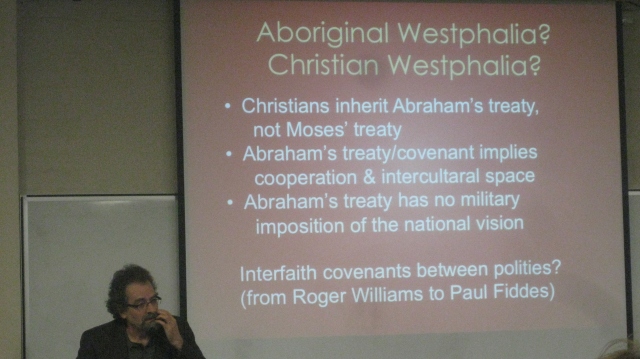On the weekend of 24-25 September Whitley College hosted a conference called Constitutions and Treaties: Law, Justice, Spirituality – these are notes from session 9 of 9. We acknowledge that this gathering, listening and learning occurred of the land of the Wurundjeri People of the Kulin Nations and offer our respects to their elders past and present, and all visiting Aboriginal and Torres Strait Island visitors present.

Line through Papua New Guinea, literally nations were “dividing the world between them”.


Roger Williams, Baptist theologian, a dissenting voice to the Doctrine of Discovery model – wanted to respect Native Americans, house church on Rhode Island for 6 years. Had to go to England at one point – needed a patent or would be annexed.
The Treaty of Westphalia was the end of the 30 Year war. No right to divide the world in two. Move from Empires to a rise of nation states.
If we think of the Treaty of Waitangi as an interfaith covenant, what are the implications of that? The phrasing of the words “you will acknowledge no other gods above me” implies an acknowledgement of other gods existing. There is a danger when uniformity is a presumption. What kinds of covenants can we imagine between polities (e.g. could a treaty have some reference to God or Creator Spirit with Bundjil and representatives of Bundjil’s land)? Any covenants (treaties) would need to be local. Can Christian churches model this?
Made under sovereignty of God (not state/federal Government)?
Entering a treaty under State/Federal terms legitimises them and their system, it’s not being legitimised ourselves.
Being hard isn’t the same as being not worth doing.
What does “local” mean/look like to people who know who they are/where they’re from.
Lutherans practiced a vernacular theology – learned the language of those they lived with whereas as other denominations refused to learn the language (and used theological grounds for that) you have to learn/imposing my theology…

1 Trackback or Pingback for this entry:
[…] Pulling together the threads – Mark Brett […]
LikeLike